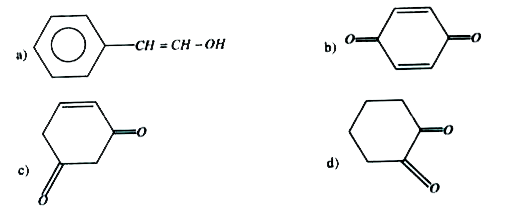Weak acids and bases are not completely ionised when dissolved in polar medium like water
H→H++A−
t0COOteqC−CαCαCα
Ka=Cα21−α=Cα2,α√KaC
∴α1α2=√Ka1Ka2,α1α2=√C2C1
( For two acids at same conc.) (for same acid at diff conc. )
0.01M CH3,COOH is 4.24% ionised. What will be the pereentage ionisation of 0.1 MCH3,COOH.Solution in Telugu
1.33%
4.24%
5.24%
0.33%
The correct Answer is:A
α1α2=√C2C1,4.24α2=√10−110−2
18α22=10,α22=1.8⇒α=√1.8=1.34%
Topper's Solved these Questions
- BOOK - AAKASH SERIESCHAPTER - IONIC EQUILIBRIUM EXERCISE - LECTURE SHEET (EXERCISE -II LEVEL -II (ADVANCED) ( Matrix Matching Type Questions))2videos
IONIC EQUILIBRIUM
- BOOK - AAKASH SERIESCHAPTER - IONIC EQUILIBRIUM EXERCISE - LECTURE SHEET (EXERCISE -II LEVEL -II (ADVANCED) (Integer Type Questions))6videos
IONIC EQUILIBRIUM
- BOOK - AAKASH SERIESCHAPTER - IONIC EQUILIBRIUM EXERCISE - LECTURE SHEET (EXERCISE -II LEVEL -II (ADVANCED) (More than One correct answer Type Questions))4videos
IONIC EQUILIBRIUM
- BOOK - AAKASH SERIESCHAPTER - HYDROGEN AND ITS COMPOUNDSEXERCISE - QUESTIONS FOR DESCRIPTIVE ANSWERS20videos
HYDROGEN AND ITS COMPOUNDS
- BOOK - AAKASH SERIESCHAPTER - ISOMERISM EXERCISE - ADDITIONAL PRACTICE EXERCISE ( PRACTICE SHEET (ADVANCED) INTEGER TYPE QUESTIONS)10videos
ISOMERISM
Similar Questions
 04:31View Solution
04:31View SolutionCalculate the change in pH of water when 0.01 mole of NaOH are added in 10 litre water.
04:31View SolutionpH of a weakacid in 0.1 M solution is 4.3. Which statements are correct ?
04:31View SolutionWhy the use of hard water is disadvantages?
09:03View SolutionTautomerism is exhibited by X number of compounds among the following. What is X.
 06:39View Solution
06:39View SolutionThe degree of dissociation of weak electrolyde is inversely proportional to the square root fo concentration. It is called Ostwald's dilution law. alpha = sqrt((K_(a))/(c)) As the tempertaure increases, degree of dissociation will increase. (alpha_(1))/(alpha_(2)) = sqrt((K_(a_(1)))/(K_(a_(2)))) if concentration is same. (alpha_(1))/(alpha_(2)) = sqrt((c_(2))/(c_(1))) if acid is same. 0.01M CH_(3)COOH has 4.24% degree of dissociation, the degree of dissociation of 0.1M CH_(3)COOH will be
01:44View SolutionThe degree of dissociation of weak electrolyde is inversely proportional to the square root fo concentration. It is called Ostwald's dilution law. alpha = sqrt((K_(a))/(c)) As the tempertaure increases, degree of dissociation will increase. (alpha_(1))/(alpha_(2)) = sqrt((K_(a_(1)))/(K_(a_(2)))) if concentration is same. (alpha_(1))/(alpha_(2)) = sqrt((c_(2))/(c_(1))) if acid is same. pH of 0.005 M HCOOH [K_(a) = 2 xx 10^(-4)] is equal to
02:28View SolutionThe degree of dissociation of weak electrolyde is inversely proportional to the square root fo concentration. It is called Ostwald's dilution law. alpha = sqrt((K_(a))/(c)) As the tempertaure increases, degree of dissociation will increase. (alpha_(1))/(alpha_(2)) = sqrt((K_(a_(1)))/(K_(a_(2)))) if concentration is same. (alpha_(1))/(alpha_(2)) = sqrt((c_(2))/(c_(1))) if acid is same. a_(1) and a_(2) are in ratio of 1:2, K_(a_(1)) = 2xx10^(-4) . What will be K_(a_(2)) ?
01:38View SolutionThe determination Δ=∣∣ ∣ ∣∣bcbα+ccdcα+dbα+ccα+daα3−cα∣∣ ∣ ∣∣ is equal to zero if
01:44View SolutionIf the roots of equation x3+ax2+b=0areα1,α2,and
α3(a,b≠0). Then find the equation whose roots are
α1α2+α2α3α1α2α3,α2α3+α3α1α1α2α3,α1α3+α1α2α1α2α3.01:38View SolutionWeak acids and bases are not completely ionised when dissolved in polar medium like water
H→H++A−
t0COOteqC−CαCαCα
Ka=Cα21−α=Cα2,α√KaC
∴α1α2=√Ka1Ka2,α1α2=√C2C1
( For two acids at same conc.) (for same acid at diff conc. )
αand α are in the ratio 1:2 at same conc. Ka1,=2×10−4, what will be Ka2,?02:43View SolutionWeak acids and bases are not completely ionised when dissolved in polar medium like water
H→H++A−
t0COOteqC−CαCαCα
Ka=Cα21−α=Cα2,α√KaC
∴α1α2=√Ka1Ka2,α1α2=√C2C1
( For two acids at same conc.) (for same acid at diff conc. )
0.01M CH3,COOH is 4.24% ionised. What will be the pereentage ionisation of 0.1 MCH3,COOH.02:26View SolutionWeak acids and bases are not completely ionised when dissolved in polar medium like water
H→H++A−
t0COOteqC−CαCαCα
Ka=Cα21−aplha=Cα2,α√KaC
∴α1α2=√Ka1Ka2,α1α2=√C2C1
( For two acids at same conc.) (for same acid at diff conc. )
Relative strength of two weak monoprotic acids may be given as08:13View SolutionWeak acids and bases are not completely ionised when dissolved in polar medium like water
H→H++A−
t0COOteqC−CαCαCα
Ka=Cα21−α=Cα2,α√KaC
∴α1α2=√Ka1Ka2,α1α2=√C2C1
( For two acids at same conc.) (for same acid at diff conc. )
αand α are in the ratio 1:2 at same conc. Ka1,=2×10−4, what will be Ka2,?02:11View SolutionWeak acids and bases are not completely ionised when dissolved in polar medium like water
H→H++A−
t0COOteqC−CαCαCα
Ka=Cα21−aplha=Cα2,α√KaC
∴α1α2=√Ka1Ka2,α1α2=√C2C1
( For two acids at same conc.) (for same acid at diff conc. )
Relative strength of two weak monoprotic acids may be given as07:38View SolutionIf the roots of equation x3+ax2+b=0areα1,α2,and
α3(a,b≠0). Then find the equation whose roots are
α1α2+α2α3α1α2α3,α2α3+α3α1α1α2α3,α1α3+α1α2α1α2α3.02:36View Solution

